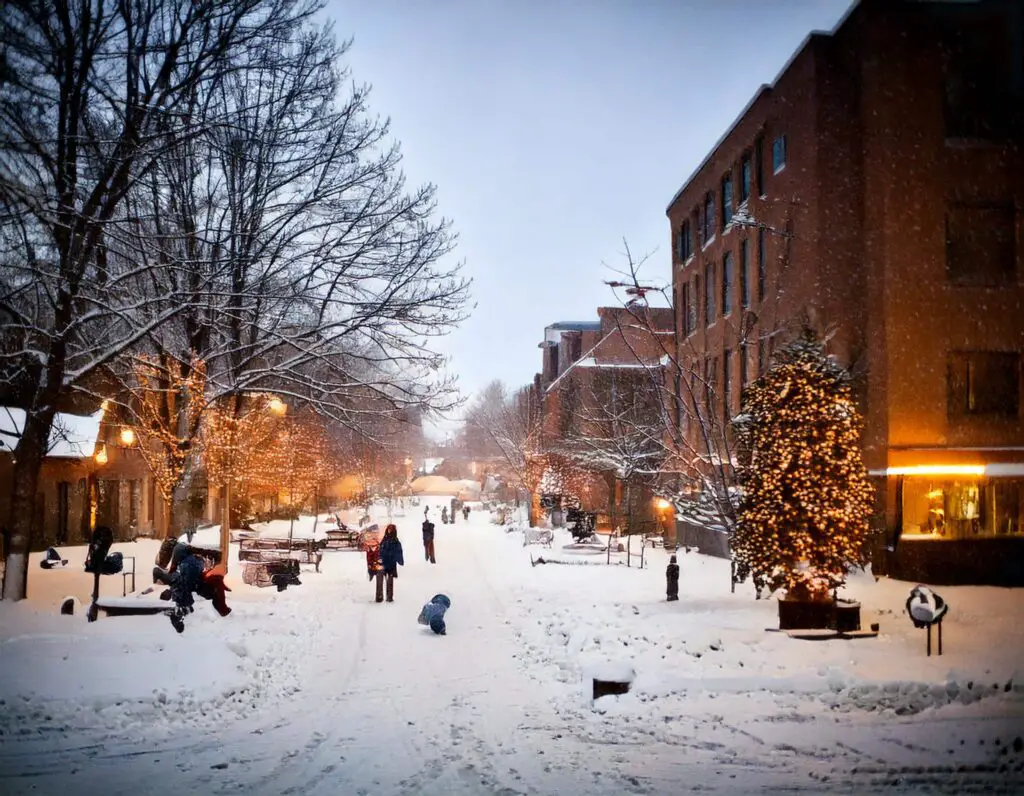Marquette, Michigan, averages nearly 197 inches of snowfall annually, ranking it among the top snowiest cities in the United States.
Marquette’s Significant Snowfall Surpasses National Averages

Marquette, located in Michigan’s Upper Peninsula, has been recognized as one of the snowiest cities in the United States. According to The Weather Channel, Marquette ranks fifth nationally, with an average annual snowfall of 196.8 inches.
This substantial snowfall is largely attributed to lake-effect snow, a meteorological phenomenon common in the Great Lakes region. When cold air masses move over the relatively warmer waters of Lake Superior, moisture is picked up and subsequently deposited as snow upon reaching the colder landmass. This process results in significant snowfall for cities like Marquette.
Record-Breaking Snowfall Events in Marquette’s History
Marquette’s snowfall is not only consistent but has also reached record-breaking levels. The city’s snowiest day on record occurred on March 14, 1997, when 26.2 inches of snow fell within a 24-hour period. The following day, March 15, 1997, the city recorded a snow depth of 63 inches, marking the deepest snow cover in its documented history.
Comparisons with Other Snowy Cities in the United States
In comparison to other snowy cities, Marquette’s average annual snowfall is significant. Valdez, Alaska, tops the list with 325.3 inches per year, followed by Sherman, New York, and Truckee, California. Marquette’s ranking highlights its prominence among the nation’s snowiest urban areas. It was named the number one destination for snow lovers by USA Today’s 10 Best.
Implications of Heavy Snowfall on Marquette’s Infrastructure and Economy
The heavy snowfall has profound implications for Marquette’s infrastructure and economy. The city allocates substantial resources to snow removal and road maintenance to ensure public safety and accessibility during the extended winter months. Additionally, the abundant snowfall supports a thriving winter tourism industry, attracting visitors for activities such as skiing, snowboarding, and snowmobiling, which are integral to the local economy.
Marquette Snowfall Patterns and Climate Considerations
Marquette’s snowfall is reflective of broader climatic patterns observed in Michigan, particularly in regions adjacent to the Great Lakes. Cities like Hancock, Michigan, also experience significant snowfall due to similar lake-effect processes. Hancock, for instance, averages 211.7 inches of snow annually, underscoring the substantial impact of lake-effect snow in the region.
Understanding these patterns is crucial for urban planning, infrastructure development, and economic forecasting in Michigan’s snow-prone areas. As climate change continues to influence weather patterns globally, monitoring snowfall trends in regions like Marquette becomes increasingly important for adapting to potential future climatic shifts.
Find More Interesting Feature Stories From ThumbWind
- Michigan Features: Unveiling the people, places, and events that make the Great Lake State unique, we’ll explore hidden gems and must-do activities.
- Weird Political News: A sarcastic and insightful take on official news released by government sources, Political Action Committees, and Public Officials from all over the US. All stories are true and sourced.
- Michigan News: News and events of Michigan’s Upper Thumb that are worth knowing in the region.
Your Turn – Like This, or Hate it – We Want To Hear From You
Please offer an insightful and thoughtful comment. Idiotic, profane, or threatening comments are removed. Consider sharing this story.
Follow us to have other feature stories fill up your Newsbreak feed from ThumbWind Publications.



